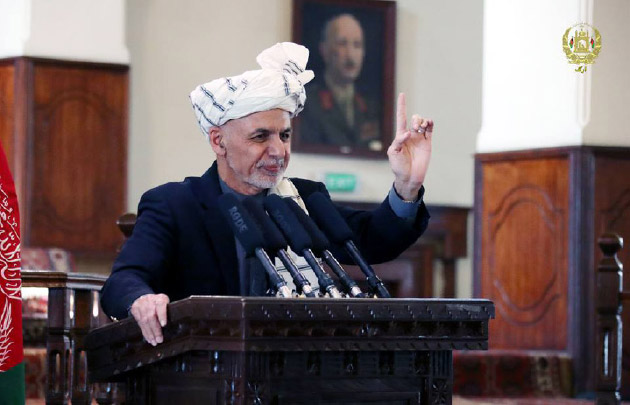KABUL - Addressing delegates at the Ulema anti-corruption meeting, the president said all citizens are responsible for their own actions.
Addressing delegates at the two-day anti-corruption conference of the Ulema Council, Afghanistan’s President Ashraf Ghani acknowledged the Attorney General Office’s efforts in fighting corruption and said when a minister is held accountable and when a three-star general goes to jail, it “indicates a good day for us and it is a sign of government’s determination to fight the problem.”
Ghani also pointed out that "mosques are the most effective platform to gather the people and mobilize them against corruption"
He said every citizen and every official including himself, the president, is responsible for their own actions and to uphold the law of the country, adding that the legal and judicial institutions are responsible for implementing the law and serving justice equally on all regardless of their post or social influence.
Ghani said: “Every official, including myself, are responsible towards the people,” adding that corruption was a “curse” that creates tension.
“Corruption is a curse which creates sedition and we must take it very seriously; sedition also brings tragedy. We inherited lots of problems. Governance in Afghanistan has not been taken from swords and guns. Afghanistan’s judicial and legal organs are obliged to implement the law equally on all,” he said.
Meanwhile, addressing the anti-corruption meeting in Kabul, Afghanistan’s Attorney General Farid Hamidi said there is a need for support from the public and Ulema to help eliminate crime, oppression and corruption. “What Ulema said about corruption reflects the voice of the Afghan people,” he said.
Issuing a declaration after their two day anti-corruption meeting, an Ulema Council member stated that government should ensure that all appointments made in government institutions are based on merit, and not nepotism and corruption Afghanistan.
Sunday was the final day of the two-day meeting which focused on rule of law and corruption in public offices in the country.
The meeting enabled delegates to exchange ideas on ways to cope with corruption and eliminate it from government offices.
On Saturday, Qiyamuddin Kashaf, Head of the Ulema Council, the country’s religious scholars council, said the majority of government institutions are affected by corruption and that this phenomenon is one of the reasons for the ongoing war in the country.
Kashaf said some people are leaning towards the Taliban due to the lack of rule of law and corruption – especially when it comes to their legal problems not being addressed.
“Most of government’s offices are corrupt. There are different types of corruption,” Kashaf said.
At the event, Hamidi also called on the people to support government’s anti-corruption efforts.
He said war, violence, unemployment and poverty have led to corruption in the country.
“This conference is not for peace; it is for a continued and strict fight against corruption and for ending corruption in government offices in Afghanistan.
“Peace is not possible when there is corruption. Corruption has dried the roots of this nation,” said Hamidi.
Religious scholars meanwhile said fighting corruption needs action not slogans.
“Let’s earn honor for our country, for the religious scholars, for our leaders and let’s get rid of this situation,” said Waezizada Behsudi, a religious scholar.
In February, Transparency International’s annual Corruption Perceptions Index ranked Afghanistan as the 4th most corrupt country in the world in 2017, trailing only Syria, South Sudan and Somalia.
The study put Afghanistan in 4th place among 180 countries in the world.
The index also highlighted that the majority of countries are making little or no progress in ending corruption, “while further analysis shows journalists and activists in corrupt countries risk their lives every day in an effort to speak out”.
The index, which ranks 180 countries and territories by their perceived levels of public sector corruption according to experts and businesspeople, uses a scale of 0 to 100, where 0 is highly corrupt and 100 is very clean.
Home » Afghanistan » Ghani Asks Ulema to Mobilize the Nation Against Corruption
Ghani Asks Ulema to Mobilize the Nation Against Corruption

